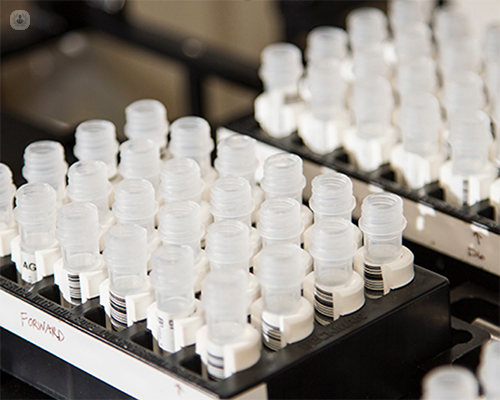Genetic testing for breast cancer
Autore:Genetic testing is carried out to test genes that cause health problems. Cancer is not usually inherited, but some types – mainly ovarian, breast, colorectal and prostate cancer - can be strongly influenced by genes and can run in families.

We spoke with Miss Christina Choy, a top oncoplastic breast surgeon based in London to find out more about genetic testing for breast cancer and what can be determined from the results.
What is genetic testing?
It’s a test used to see the likelihood of getting breast cancer in your lifetime. Either using your blood or using cells of a sample to see the genetic profile of the body. This is to see if there is a change in genome that makes certain genes more active, or latent, which could make the patient prone to repairing a defect in the mechanisms, increasing the risk of cancer formation. Genetic testing is used to check for cancer related genes but checks can also be done to see if there are other genes with other inherited genes, or other syndromes.
What other types of genetic tests are available?
As a breast surgeon, I usually do gene testing related to breast cancer. However, tests to check for colorectal, melanoma and pancreatic cancer are also available. Checks can be made to see if there are some genes that are more prone to down syndrome or Leukaemia.
How are genetic tests done?
There are usually 2 steps to genetic testing
1. A relative with cancer has a diagnostic blood test to see if they have a cancer risk gene. This should happen before any healthy relatives are tested.
2. If your relative’s test is positive you can have the predictive genetic test to see if you have the same faulty gene.
Who should consider genetic testing for breast cancer?
Family history, first degree or second-degree relatives. Female members are more at risk of breast cancer. How old family members are.
What do the results of a genetic test mean?
If there is a gene mutation there is a defect in the gene and that person is more prone, but it doesn’t mean they will always have the cancer and it depends on the type of gene and how many family members involved. Lifetime risk varies. It also means that if there is a gene there is half a chance the gene could be inherited also by your children.
A positive result doesn’t necessarily mean you’re definitely going to develop cancer but means you have a greatly increased risk.
How can consumers be sure a genetic test is valid and useful?
Depends on what the person is looking for. Psychologically the patient has to be prepared if they decide they’d like to take one of the tests. The lifetime risk can be up 87% for breast cancer.
After genetic testing, what are some of the options?
Risk reduction surgery through breast surgery (mastectomy), it can be at 90 to 95% effective in reducing the risk.
Surgery can also be used to reduce ovarian cancer risk, this would be called a hysterectomy. Women who have their ovaries removed before the menopause dramatically reduce their risk of developing ovarian cancer. The risk of developing breast cancer can also go down by up to 50%.
There is no standard screening to check for the likelihood of developing ovarian cancer, however there is ultrasound scanning for the ovaries and the blood test CA125.
It is important to check for lumps and new symptoms each month for breast cancer. It’s a good idea to check how likely you are to develop breast cancer, especially if there is a strong family history.
If you feel it may be a good idea for you to a genetic test done. Please feel free to book an appointment via Miss Christina Choy’s Top Doctors’ profile .


